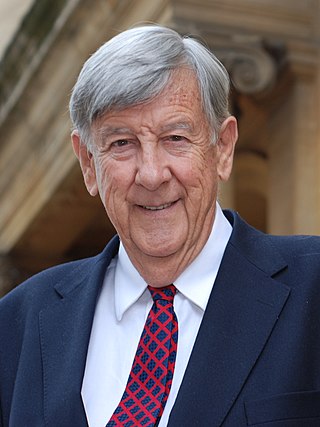Related Research Articles

The Department of Computer Science at the University of Manchester is the longest established department of Computer Science in the United Kingdom and one of the largest. It is located in the Kilburn Building on the Oxford Road and currently has over 800 students taking a wide range of undergraduate and postgraduate courses and 60 full-time academic staff.

The Oxford Internet Institute (OII) is a multi-disciplinary department of social and computer science dedicated to the study of information, communication, and technology, and is a part of the Social Sciences Division of the University of Oxford, England.

James Martin was an English information technology consultant and author, known for his work on information technology engineering.

The Department of Computer Science is the computer science department of the University of Oxford, England, which is part of the university's Mathematical, Physical and Life Sciences Division. It was founded in 1957 as the Computing Laboratory. By 2014 the staff count was 52 members of academic staff and over 80 research staff. The 2019, 2020 and 2021 Times World University Subject Rankings places Oxford University 1st in the world for Computer Science. Oxford University is also the top university for computer science in the UK and Europe according to Business Insider. The 2020 QS University Subject Rankings places The University of Oxford 5th in the world for Computer Science.

Michael J. Butler is an Irish computer scientist. As of 2022, he is professor of computer science and Dean of the Faculty of Engineering and Physical Sciences at the University of Southampton, England.
Roger John Cashmore is the chair of the United Kingdom Atomic Energy Authority. Previously he was principal of Brasenose College, Oxford, and professor of experimental physics at the University of Oxford. His interests include the origin of the masses of particles and the Higgs boson.

Founded in 1990, the Information Security Group (ISG) is an academic department focusing on Information and Cyber Security within the Engineering, Physical Sciences and Mathematics School (EPMS) at Royal Holloway, University of London. It has around 25 established academic posts, 7 visiting Professors or Fellows and over 90 research students. The Founder Director of the ISG was Professor Fred Piper, and the current director is Professor Chris Mitchell. Previous directors include Professors Peter Komisarczuk, Keith Martin, Keith Mayes and Peter Wild.
Andrew Clive Simpson is a British Computer Scientist. He is Director of Studies, Software Engineering Programme at University of Oxford. He is Governing Body Fellow of Kellogg College.

Oscar Marius Nierstrasz is a professor at the Computer Science Institute (IAM) at the University of Berne, and a specialist in software engineering and programming languages. He is active in the field of

Jeremy Gibbons is a computer scientist and professor of computing at the University of Oxford. He serves as Deputy Director of the Software Engineering Programme in the Department of Computer Science, Governing Body Fellow at Kellogg College and Pro-Proctor of the University of Oxford.
Software Engineering Programme is a centre for advanced education and applied research at the Department of Computer Science of the University of Oxford. It teaches the principles of modern software engineering, together with the tools, methods, and techniques that support their application. The current Director of Software Engineering Programme is Professor Jim Davies
The UK Large-Scale Complex IT Systems (LSCITS) Initiative is a research and graduate education programme focusing on the problems of developing large-scale, complex IT systems. The initiative is funded by the EPSRC, with more than ten million pounds of funding awarded between 2006 and 2013.
Carl E. Landwehr is an American computer scientist whose research focus is cybersecurity and trustworthy computing. His work has addressed the identification of software vulnerabilities toward high assurance software development, architectures for intrusion-tolerant and multilevel security systems, token-based authentication, and system evaluation and certification methods. In an invited essay for ACSAC 2013, he proposed the idea of developing building codes for building software that is used in critical infrastructures. He has organized an NSF funded workshop to develop a building code and research agenda for medical device software security. The final committee report is available through the Cyber Security and Policy Institute of the George Washington University, and the building code through the IEEE.

Michael Goldsmith is a British computer scientist, senior research fellow and Lecturer at the University of Oxford, England. He is a member of Oxford University's Department of Computer Science. He is an associate director of Oxford University's Cyber Security Centre, and an Oxford Martin Fellow of The Global Cyber Security Capacity Centre. He is a fellow of Worcester College, Oxford.

Norman E. Fenton is a British mathematician and computer scientist. He is the Professor of Risk Information Management in the School of Electronic Engineering and Computer Science at Queen Mary University of London. He is known for his work in software metrics and is the author of the textbook Software Metrics: A Rigorous Approach, as of 2014 in its third edition.
Sadie Creese is a British cybersecurity specialist. She is Professor of Cybersecurity in the Department of Computer Science at the University of Oxford, Director of the Global Cyber Security Capacity Centre at the Oxford Martin School, co-director of the university's Cyber Security Centre and of the Martin School's Institute for the Future of Computing, and a fellow of Worcester College, Oxford.

Eric Bodden is a German computer scientist. He holds the Chair of Secure Software Engineering at the Heinz Nixdorf Institute of the Paderborn University and is Director of Software Engineering and IT Security at the Fraunhofer Institute for Mechatronic Design (IEM). He is also head of the engineering department in the Collaborative Research Centre 1119 CROSSING at the Technical University of Darmstadt.

Prashant Pillai is an Indian-born British computer scientist. He is Associate Dean for Research and Knowledge Exchange and Professor of Cyber Security at the University of Wolverhampton. He is also the Director of Cyber Quarter - Midlands Centre for Cyber Security. He specialises in security and privacy for communication networks. Pillai has led several national/international research projects in the areas of networking protocols and cyber security. He has been invited for talks at various international conferences and has published over 100 papers within peer-reviewed journals and conferences.
Ali Dehghantanha is an academic-entrepreneur in cybersecurity and cyber threat intelligence. He is a Professor of Cybersecurity and a Canada Research Chair in Cybersecurity and Threat Intelligence.
Agathoniki Trigoni is a Greek computer scientist who is a professor in the University of Oxford Department of Computer Science and a Fellow of Kellogg College. Trigoni is the Chief Technology Officer of Navenio, a company she founded to provide scalable and accurate indoor location systems. She was elected a Fellow of the Royal Academy of Engineering in 2022.
References
- ↑ "Centre for Doctoral Training in Cyber Security" . Retrieved 19 January 2015.
- 1 2 "Dr Andrew Martin: Oxford University" . Retrieved 10 October 2010.
- 1 2 3 4 5 "Andrew Martin: Oxford University" . Retrieved 10 October 2010.
- ↑ "Publication of Dr. Andrew Martin:Oxford University" . Retrieved 10 October 2010.
- ↑ Andrew Martin: Publication List Details, Scientific Commons.